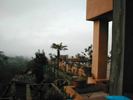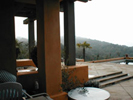


Nestled between the rugged Pacific Coast on the west and rolling hills and mountains on the east, Sonoma offers a grand landscape of beautiful valleys and winding roads to explore. Visitors may taste wines at grand chateaus or small converted barns, sample fresh fruits and vegetables along farm trails, enjoy a matching of Sonoma wines and foods prepared in the friendly atmosphere of our fine restaurants and then retire to the elite Runningwood Ranch, overlooking the valley.
The wineries below are all local to Runningwood and lists the driving time and miles from Runningwood. All of these wineries are less than 30 minutes away driving. For the athletic, many are within walking distance. These are considered among the world's finest wineries.
Within each wine grape are contained the essential ingredients of fermentation - sugar and yeast. Although any ripe grape will ferment naturally, shaping the process to produce exceptional and agreeable wines is truly an art form. Sonoma Valley, with its dry, moderate Mediterranean climate, is an ideal niche for the seasoned vintner. The location of the valley, strongly impacted by billows of coastal fog and other important climatic factors, offers a plethora of locations for growing some of the world's finest varieties of grapes. Good grapes make good wine, the saying goes, and in Sonoma Valley, great grapes are abundant.
Grapes are a drought-resistant, deeply-rooted family of vining plants, and exhibit a vigorous growth habit. The vine's fast-growing tendrils naturally attach themselves to any nearby object affording a good foothold, and cultivated grapes are pruned each year to keep them under control and to improve the grape harvest. While vineyards used to largely consist of vines growing "freehead," that is not tethered to any trellis, most vineyards today are designed for plants that grow on trellises. Trellis systems vary, most modern ones are designed to lift the leaves and tendrils away from the berries, or fruit of the vine. This improves the ripening and air circulation, lessening the chance for mold to develop during the cooler, wetter weather periods that often happen in September and October.
After a long growing season, growers must make the key decision as to when to harvest their grapes. As time progresses and grapes ripen, natural sugars within the grape accumulate, and the grape's acidic content slowly diminishes. While some vintners prefer their grapes slightly more acidic and less sweet, others prefer their grapes fully ripe. Harvesting occurs between mid August and October, when the growers decide the grapes have reached their ideal balance. The grapes are frequently harvested by hand in Sonoma Valley, although some major wineries have taken to harvesting at night, using mechanical harvesters in order to keep the grapes cool.
After harvesting, the grapes are taken to the wineries and placed into a crusher-stemmer, where the crushing process begins. Juice is released from the berries, and the berries are removed from their stems by rotating paddles within the machine. The mixture of berries, once crushed, become what is called "must". To form white wine, the must is moved to a press where the juice is separated from skins, stems, and other pulp. It is taken to a chilled, stainless steel fermenting tank. Red wines, however, gain their color by prolonged contact of the initially white juice with their dark skins. Thus, the must used to make red wines is sent first to a fermenter and is pressed later.
The fermentation process is commonly aided through the use of cultured yeasts, which often are preferable to wild yeasts. Wild yeasts are generally too weak to complete fermentation and tend to yield unsatisfactory flavors. To preserve the fruit flavor of the wine, fermentation occurs at a temperature range of 45 to 55 degrees; if, however, the vintner wishes to produce bouquets (smells associated with wine rather than fruit), fermentation occurs at 80 to 95 degrees.
After fermentation, the wine is clarified by the tried and true method of gravity. Fining agents may be used later to further purify the wine. The wines are then pumped to either French or American Oak barrels where they are aged from six months to three years to add complexity. The degree to which the oak flavors become a flavor component of the finished wine is a subjective decision of the individual winemakers. While some wines are best enjoyed within a year or two of bottling, many wines continue to improve long after being bottled, and often find their best expression anywhere from 5 to 10 years after bottling.
Each winery in Sonoma Valley utilizes the basic winemaking process described above, adding its own particular nuances and methods in attempting to create a wine of distinction. It is for this reason, among others, that Chardonnay tastes differently from one winery to another. Sonoma Valley winemaking is a science, and an art, and the hand of the winemaker can be tasted in every bottle.
SONOMA VALLEY VISITORS BUREAU
453 First Street East, Sonoma CA 95476
Phone 707-996-1090
Fax 707-996-9212
Email info@sonomavalley.com
Read about the historical influence
of wine making in Sonoma.